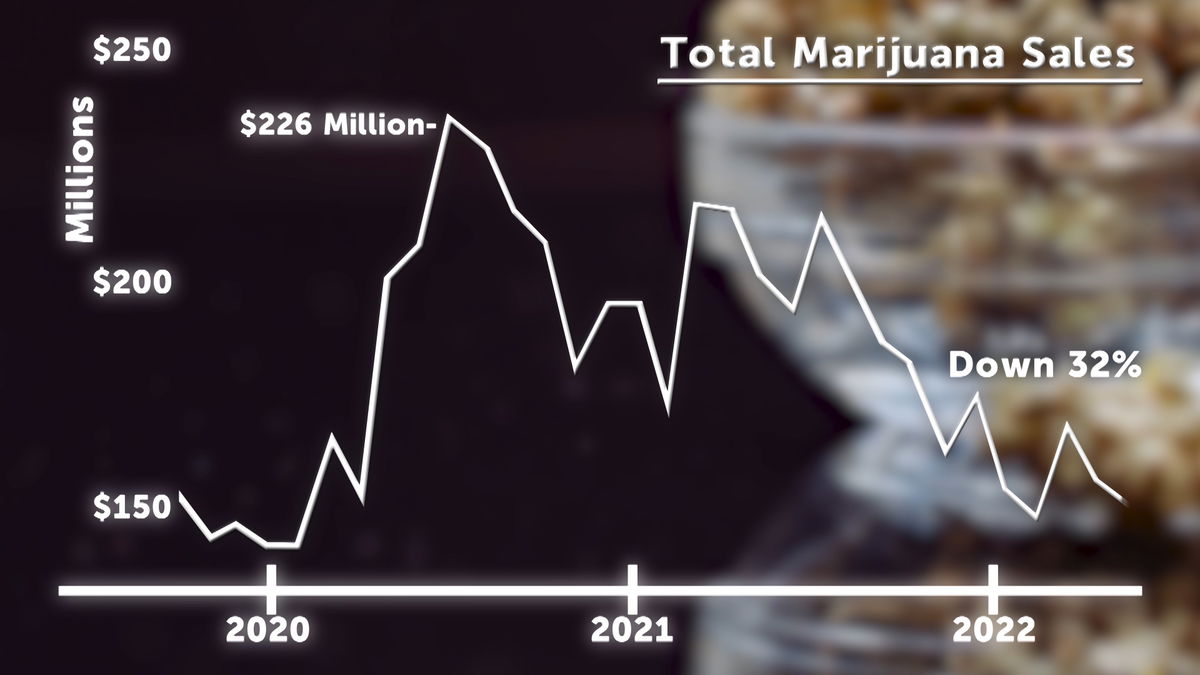Marijuana sales plummet across Colorado in 2021
Like marijuana or not, it's a big industry in Colorado.
The growing and selling of both medical and recreational marijuana provides thousands of jobs and tens of millions of dollars in tax revenue every year that pays for school construction, drug programs, recreation centers, and more.
However, sales have slumped over the past year, and it’s already already leading to layoffs and major concern about the future of the business.
There are several factors that have contributed to the decline.
On April 1 on Las Cruces, New Mexico, the first ever sale of recreational marijuana took place in that state.

Dispensaries there are expected to do $300 million in sales a year.
New Mexico, however, is only the latest state in a growing list where it can now be sold.
You can now find medical or recreational marijuana in all but 12 states, including half of those that surround Colorado.

Another factor is the pandemic.
Monthly marijuana sales in Colorado hit a record high in July of 2020, $226 million, when people were still largely working from home and receiving large government stimulus checks.
Sales remained high through the first half of 2021, but then began a steady decline.
In May of this year, sales were down just over 32 percent from that July 2020 mark.

Adam Orens is the founder of MPG Consulting, the firm contracted by the Colorado Department of Revenue to track marijuana sales and trends.
Orens believes 10 years after voters approves the legal sale of recreational marijuana, Colorado has simply reached a plateau in sales, achieving “market maturity” as he calls it.
However, he agrees that many cities will be impacted by the new business in surrounding states.
“A city like Trinidad's sales, or Pueblo's, will decline, because folks that may be coming from Dallas can go somewhere in New Mexico instead,” he says.
Still, Orens blames most of the recent decline on people heading back to work, and society returning to normal after the pandemic.
“I think it's more about Covid than anything else,” he says.
The marijuana industry, however, isn't so sure.
Tom Scudder of EmJ’s Dispensaries says business at his medical dispensaries is down a whopping 50 percent in the past year.
It has forced him to lay off more than a few workers.
“I think we laid off 27 people in the grow, and probably 6 in the retail store,” he says.
According to Scudder, medical sales haven't been this bad since 2013, long before the pandemic.
“They think we're all getting rich, and things are going extraordinarily well, but if you're on the inside of the industry, you understand the harsh reality that we're dealing with right now, and it's a pretty tough situation,” he says.
Tiffany Goldman is the chairman of the Marijuana Industry Group (MIG), which represents the owners of roughly 400 dispensaries across the state, although that number is shrinking.
“They are closing their shops because they cannot continue,” she told KRDO.
"I'm talking about thousands of jobs that are going to be lost."
Both Goldman and Scudder believe the recent plummet in sales is not due to the pandemic cooldown, but House Bill 21-1317, which passed last year and took effect January 1.
It was intended to reduce the number of teens using marijuana, and limits the amount of cannabis concentrate an adult can buy to 8 grams a day.
Previously, the limit was 40 grams a day.

"So it went from already restricted to far more restricted as of January 1,” explains Scudder.
Dispensary owners worry that too much taxing and regulations will lead to what's happening in California and Oregon, people going back to buying illegally grown marijuana instead.
“The black market is going to thrive once again,” predicts Goldman.
That would threaten not only those businesses that remain open, but the annual tax revenue to the state, which amounted to $423 million in 2021 alone.
“If we continue to regulate and tax at the level we have done recently, it's a very real possibility we could essentially run the business out of town,” says Scudder.
State Representative Alec Garnett, who sponsored HB 1317 last year, did not return calls to comment on the impact of the legislation so far.
If the current sales trend continues, MIG predicts the state will bring in $80 million less in tax revenue than it did in 2021.
